

Tao Te Ching
Search Sages
Enter all or part of an sage's name or biography in the fields below, then press tab or enter to filter the list of Authors. Click the headings Name or Biography to sort by that column. Diacritics are ignored when searching.
Click on the author's name to go to their page.
| Author Name | Biography |
|---|---|
| Zisi | 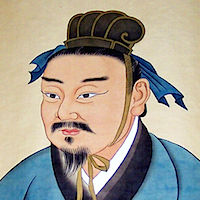 Zisi ZisiConfucius' grandson and early influence on Neo-Confucianism The only grandson of Confucius, writer of the influential Doctrine of the Mean, and teacher of Confucian thought to Mencius; Kong Ji evolved his grandfather’s insights into the difference between real and believed truth, the relativity of understanding, and the possibilities of learning lessons from nature and applying them to everything from politics to daily life. His writings were a deep influence on Zhu Xi and the Neo-Confucian movement becoming one of “The Four Books” that set the educational and political framework in China and throughout Asia for more than 700 years, from c. 1150 to 1905. |
| Ziryab |  Ziryab ZiryabSinger, poet, polymath, freed slave, teacher, and one of the greatest influences on world culture; Ziryab’s name is almost unknown in most of the world although the traditions and styles he initiated are commonplace. He invented and popularized the early form of toothpaste, the three-course meal, asparagus, the use of tablecloths, wearing hair in bangs, and using glass containers for drinks. Founder of the 500-year Andalusian music tradition, he laid the early groundwork for classic Spanish music, revolutionized the musical instrument design that became the lute, and created a musical style that influenced European minstrels, troubadours, and the course of European music. |
| Zhu Xi | 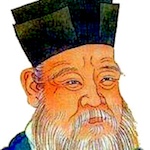 Zhu Xi Zhu XiCalled by historians the “second most influential thinker in Chinese history” and “one of the most influential people” in the last millennium, Zhu Xi blended Confucianism, Taoism, and Buddhism into a tradition called Neo-Confucianism. He synthesized ancient teachings into The Four Books which became the heart of the educational, bureaucratic, and governmental system for over 700 years in China as well as Japan, Korea and other countries. More Confucian than Buddhist or Taoist, the emphasis is on practical wisdom rather than the wisdom beyond words but still set a foundation for wise and compassionate government leading to peace and prosperity. |
| Zhou Dunyi | 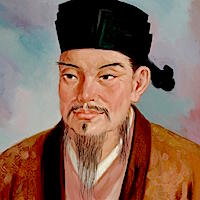 Zhou Dunyi Zhou DunyiFirst philosopher to popularize the yin-yang symbol, founder of Neo-Confucianism, famous for his authenticity, and major influence on the greatest Confucian thinker since Confucius, Zhu Xi; Zhou Dunyi emphasized living in accord with nature by understanding the relationship between universal forces and the best human conduct. Said to have loved grass too much to cut it, he exemplified the ideal of wu wei. He integrated many Buddhist and Taoist teachings with traditional Confucian concepts. Although an active government official throughout his life, he was mainly unknown and unappreciated working as a simple record keeper (like a modern-day journalist) during much of his life. Later though, one of his books became the basis for neo-Confucian ethics and Zhu Xi called him “the first great sage of the Song Dynasty.” |
| Zheng He | 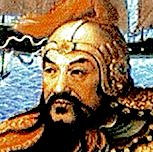 Zheng He Zheng HeEmperor Zhu Di’s closest advisor, over 100 kg, over 2 meter tall formidable eunuch soldier, and famous Muslim explorer; Zheng He and the other admirals he trained in ships 4-5x bigger than Columbus’s sailed through the Strait of Magellan 98 years before Magellan, up and down the North American coasts 70 years before Columbus, surveyed the Arctic polar region and Antarctica 400 years before Europeans, Australia 300 years before Captain Cook, and rounded the Cape of Good Hope 66 years before the Portuguese Dias. Modern scholars credit him with "reshaping Asia" and propose that all of 15th century naval history was basically his story and the consequences of his voyages. Commanding a fleet of over 2000 ships carrying libraries of over 11,000 books to share information and technology with the rest of the world, Zheng He’s legacy is little known but one of the most influential in all history. |
| Zhang Xuecheng 章学诚 | 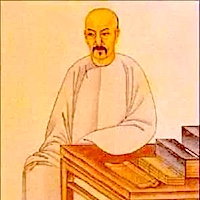 Zhang Xuecheng 章学诚 Zhang Xuecheng 章学诚A famous historian, philosopher, and writer who was mainly unknown during his lifetime dying in poverty with few friends; Zhang Xuecheng's fame only began almost 100 years after he died. A revolutionary thinker, he crossed the status quo view that Confucianism is based on timeless principles and described it as an evolving set of realizations deepening as it faced and explained contemporary changes. He condemned self-serving partisanship, encouraged diversity, and individuation. A true advocate for the words over the sense, he emphasized the need to transcend language rather than becoming a slave to concepts. His focus on China's difficult struggle to blend the strong Taoist, Buddhist, and Confucian traditions into what's called now neo-Confucianism; has a powerful relevance to our own time of intense cultural, political, and religious amalgamation. |
| Zeno | 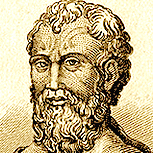 Zeno ZenoSelf-made wealthy merchant, shipwrecked and impoverished Phoenician, founder of Stoicism - a kind of reformation of Epicureanism that had corrupted from the pursuit of happiness to the pursuit of pleasure; Zeno emphasized virtue and goodness as essential to true happiness and peace of mind. An internationalist wanting to break down all national and racial barriers with no nations, classes, rich or poor, he defined vice as the rejection of reason making happiness impossible. Crediting Socrates, he defined the universe as god and acting on hope and fear, seeking pleasure or avoiding pain as the negative impulses causing suffering. His Stoic philosophy remained dominant for c. 800 years, influenced Seneca, Epictetus, and Marcus Aurelius. A major crater on the moon is named after him. |
| Zarathushtra |  Zarathushtra ZarathushtraSaid to have laughed out loud the day he was born and considered a true prophet by Islam, an important influence on Judaism, the Greek philosophers, and on philosophy in general, Zarathushtra founded Zoroastrianism, the official religion of Persia from 600 BCE until 650 CE when Islam took over. A shaman called inventor of astrology, he based his teachings on what we now call the Golden Rule, founded the Magi tradition and opposed the oppressive caste system of his time. Although against polytheism and emphasizing belief, his religion taught the meaningfulness of each small action increasing goodness or evil. From it we inherit common symbols like magic, heaven and hell, purgatory, Satan, the 3 Wise Men, angels, Christmas, and the Last Judgment. |
| Zainab, Sayyeda Zaynab bint Ali |  Zainab, Sayyeda Zaynab bint Ali Zainab, Sayyeda Zaynab bint Ali Grand-daughter of the Prophet Muhammad, daughter of revered leader Ali ibn Abi Talib (regarded by Shia as the most important figure after Muhammad, by Sunnis as the greatest warrior champion of Islam, and by Sufis as the originator of their lineage; his legacy split Islam into Shia and Sunni), effective political leader, and one of the most admirable people in early Islam; Zainab - famous for her wisdom, strength and patience - is a rare instance of reverence for both Sunnis and Shi’as. Called the "Hero of Karbala,” she endured physical pain and mental torture to stand up against tyranny, speak the truth, and set Islam on a more just and compassionate course. In Iran today her birthday is known as Nurse's Day. |
| Yuval Harari | 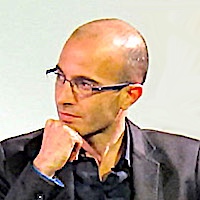 Yuval Harari Yuval HarariIsraeli historian, professor, and philosopher Harari lives with his husband in a small, cooperative community near Jerusalem where he teaches, and writes thoughtful, challenging books. His best-seller, Sapiens—already translated into 45 different languages—examines our history going all the way back to the Cognitive Revolution 70,000 years ago and describes an unconventional but hard-to-dismiss view of progress, technology, free will, and the future. A strong advocate for animal rights and close student of S. N. Goenka, he practices and teaches Vipassana meditation as well as using it as a research tool for developing his understanding of history, evolution, and the nature of human cultur |
| Yunmen Wenyan | 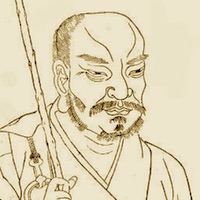 Yunmen Wenyan Yunmen WenyanThe most eloquent Chan master One of the most famous Zen masters in later day Japan, Ummon founded one of the five major Chán schools in China. This school compiled and wrote the Blue Cliff Record, flourished for hundreds of years, and continues today. Supported by the region's king, and famous throughout China and Korea, Ummon rejected the fame and many offered honors while building a new monastery in a more remote location. Many of his recorded statements later became koans—5 listed in The Gateless Gate, 8 in the Book of Equanimity, and 18 in the Blue Cliff Record. |
| Yung-lo |  Yung-lo Yung-loSon of the farmer-Buddhist monk-general who ended the Yuen dynasty and became emperor, Yung-lo was born into luxury and power. But later, in order to escape assassination attempts, had to pretend madness and become a vagrant. Transforming this disaster into opportunity, he became emperor himself. As emperor, at a time when the next largest navy in the world had 300 small ships, he built a fleet of over 3500 huge vessels that sailed all over the world and established colonies from Africa to the United States more than 70 years before Columbus. He moved his capital to Beijing, built the Forbidden City, promoted a world-wide surge in science, education, and religious tolerance and supporting Tibetan Buddhism started the Karmapa’s Black Crown Ceremony. |
| Yuanwu Keqin | 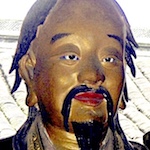 Yuanwu Keqin Yuanwu KeqinAuthor of the most famous Zen book, The Blue Cliff Record, Yuanwu became a renowned spokesperson for the non-thought lineages teaching a broad, open approach to religion beyond sectarianism, dogma, emotion and ritual that he saw as enemies to true understanding and realization. He left his Confucian family for a Buddhist monastery at a time when Confucianism, Buddhism, and Taoism were mingling and rejuvenating each other. His influence helped the spreading of this powerful force throughout the country and culture. |
| Yu the Great | 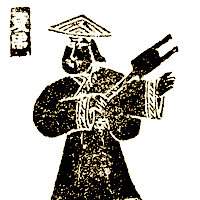 Yu the Great Yu the GreatLeader of the Five Water Immortals Philosopher-king, prototype ruler of ancient China, Taoist water deity, and leader of the Five Water Immortals; Yu became famous for introducing flood control, establishing dynastic rule, and for his impeccable integrity. One of the few Chinese rulers to be given “The Great” title, he is often seen in statues carrying an ancient hoe. Imperial emperors including Qin Shi Huang often traveled to his shrine to perform rituals. |
| Yoshida Kenkō | 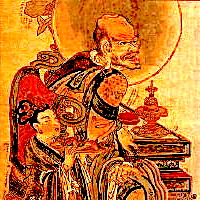 Yoshida Kenkō Yoshida KenkōInspiration of self-reinvention After a life working as an officer of the guards in the Imperial palace, Kenko became a monk and one of the most famous authors of his era. His speculations on universal themes like beauty, nature, impermanence, and friendship found a deep resonance of feeling during his own time, one that continued fresh through the time since, and one remains part of Japanese school curriculum today. A paragon demonstrating the ever-present possibilities of re-inventing ourselves, Kenko’s transformation from a menial worker into an insightful sage became an inspiration in itself, beyond the wisdom in his essays and poems themselves. |
| Yòngjiā Xuānjué | 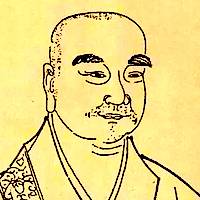 Yòngjiā Xuānjué Yòngjiā XuānjuéCalled “the Overnight Guest" because of proving his realization to Huineng in just one night, Yongjia is best remembered because of his writings, especially the Song of Enlightenment or Song of Freedom (Shodoka 證道歌) still popular in contemporary Western Zen circles and memorized by students in Asia. It emphasizes practice over study and the contrast between dharma nature and buddha nature. Yongjia is famous for not having a teacher but realizing enlightenment from only reading and contemplating the Sutras. |
| Yoko Ono | 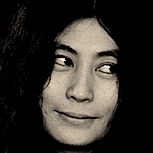 Yoko Ono Yoko OnoThe daughter of one of Japan’s richest banking clans in a long lineage of samurai warrior scholars; Yoko One fell from attending exclusive schools in New York and Japan to begging for food with all the family possessions in a wheelbarrow. A true, faithful life-artist, she collaborated with John Lennon’s public protests against the Viet Nam war, co-wrote ”Give Peace a Chance” inspired many famous songs, and was the only woman to sing a lead vocal on a Beatles’ recording. Continuing her life as “the world's most famous unknown artist,” she’s extended John Lennon’s legacy of political and social activism, philanthropy, and influence on world culture. |
| Yoka Daishi | 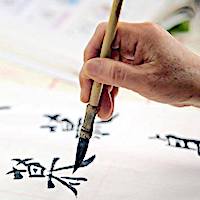 Yoka Daishi Yoka Daishi |
| Yin Xi | 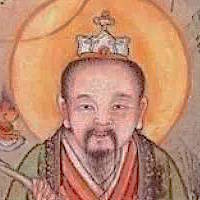 Yin Xi Yin XiLao Tzu’s first disciple and Taoist patriarch Yin Xi, Yin Hsi, Guan Yin Zi 關尹子 (fl. 6th century BCE) |
| Yi-Ping Ong | 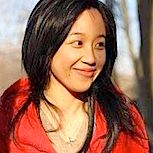 Yi-Ping Ong Yi-Ping OngYi-Ping Ong (c. 1978 - ) Johns Hopkins Assistant Professor, moral and political philosopher, author, human rights activist, and NGO volunteer director; Yi-Ping Ong helped republish the Charles Muller’s translation of the Tao Te Ching and added insightful notes on the chapters, the historical context, and the influence on both Chinese and world culture. A short story she wrote was chosen as one of the 100 Distinguished Stories of 2003 and her Ph.D. dissertation received a major Harvard University award. Although an academic who attended Columbia, Oxford, and Harvard Universities and is now a university professor; her groundedness in the simplicity of Lao Tzu’s vision seems to maintain an allegiance to the sense over the words, reality over ambition, and wu wei over dualistic gaining ideas. |